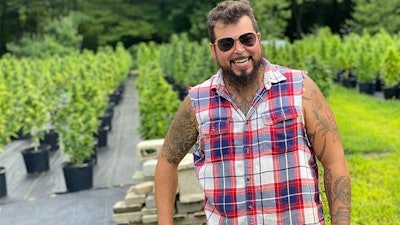
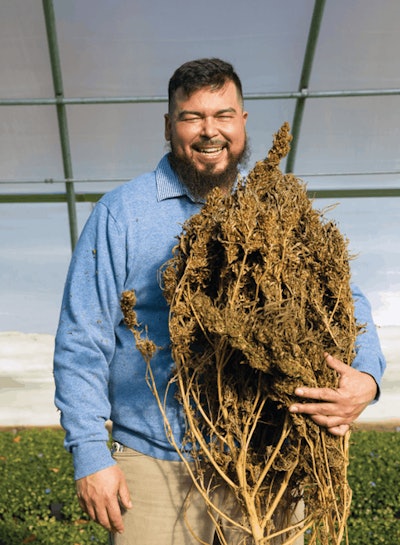
Luis Vega, founder and CEO of ¡WEPA! Farms, says it was a pair of jeans that helped him fully understand hemp’s potential.
“When I was first getting interested in the industry, I bought a pair of hemp jeans. This pair of pants is now about 16 years old, and they still look like they’re brand new. They’re relatively comfortable, too,” Vega says.
Today, Vega is playing a role in helping hemp reach that potential. He now runs or manages 270 acres of hemp farmland, primarily in rural Shelton, Conn., about an hour north of New York City. ¡WEPA! Farms works with multiple cultivars of hemp, contracts with agricultural businesses across three states—Massachusetts, New York and Connecticut—and sells everything from hemp face masks to cannabidiol (CBD) coffee online.
While the technical and entrepreneurial achievements he’s made with ¡WEPA! so far are impressive, he’s eager to realize the future he sees for hemp: a return to its widespread status as not just a therapeutic product, but also a multifunctional textile, building material, and source of income for others in agriculture.
“As a farmer, it has started to become more socially acceptable to integrate hemp into your crop rotations. ... I want other agricultural providers to understand that integrating hemp is a viable option—for everybody,” Vega says.

Founding ¡WEPA!
While his experiences with hemp came a bit later in life, Vega became acquainted with cannabis as a teenager. Growing up in the Brooklyn borough of New York City, he was diagnosed with Crohn’s disease and ulcerative colitis—a tough hand to be dealt at a young age.
“They removed my large intestine—the entire thing,” Vega says. “I was given an ostomy bag in my teenage years. ... I found cannabis at 16 years old, and it gave me back my quality of life. I knew then that it was my plant for the rest of my life.”
He went on to study finance at the University of New Haven, earned a postgraduate degree in business, and began working in corporate contract facility management. But his passion for cannabis never wavered, and he spent evenings and weekends doing anything and everything possible to get involved in the industry.
“I started doing some sales for a CBD company on the West Coast that a buddy in college had started ... so while I was working my regular job, I was doing CBD sales, I was traveling out to farms [in states where hemp production was legal], I was really starting to get engulfed in the agricultural side of hemp and the possibilities it had,” Vega says.
When Connecticut legalized hemp production in 2019, the local farms Vega had already been working with decided to add hemp into their crop rotations.
Soon after, Vega says he decided to cash out his 401(k) and “invest in myself.” He purchased some land, got his hemp license, purchased seed and began growing it himself.
Vega was part of the Connecticut Department of Agriculture’s hemp pilot program, which launched in May 2019 (just a week after it was legalized). He was one of 109 growers awarded a license to cultivate hemp in Connecticut that year.
“Our first year we grew 5 acres. ... The land had already come with strawberries, blueberries and a couple other crops, so we added hemp as part of our agricultural rotation,” he says.
Vega was also adamant that he and his team would oversee the processing of the plant to maintain better control over the final product.
“We also got ourselves a processing license, which allowed us to harvest and process our own materials, so we didn’t have to go out and look for a processor,” Vega says. “I like to believe that’s something that contributed to our success.”
Since that first year, things have been a bit of an up-and-down ride. After going through the months-long process of applying for and obtaining its license, the ¡WEPA! team was able to process its harvest throughout the winter of 2019.
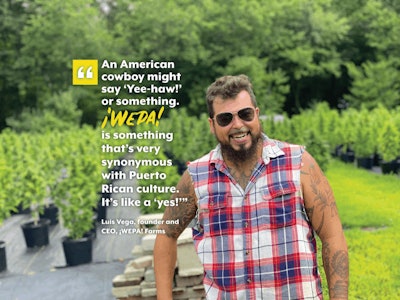
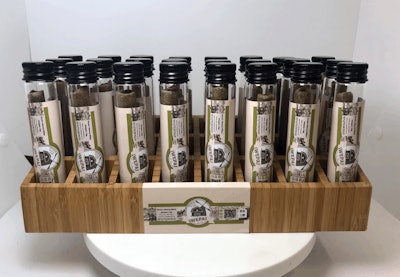
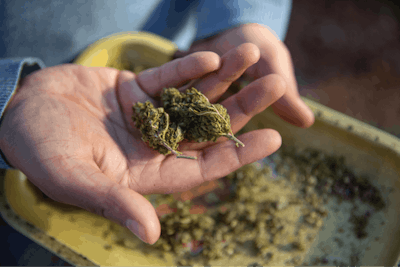
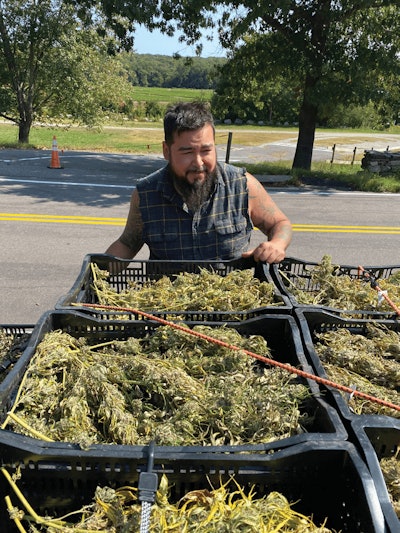
Where They Are Now
Today, ¡WEPA! Farms manages, contracts or operates nearly 300 acres of farmland. After Vega obtained his hemp license, neighboring farms, including O’Hara’s Nursery and Stone Garden Farms, wanted to get in on the new cash crop as well, providing ¡WEPA! with an easy path to new partnerships.
“We manage their program for them, so we get their seeds, we help them manage [integrated pest management], we do crop schedules, we do planting schedules, we do harvesting schedules with them, and we work it all out. ... It’s their license, while we manage their program so that they can continue doing things in their day-to-day,” Vega says.
While ¡WEPA!’s footprint extends across three states, Vega is especially excited about the farm he helps manage in Puerto Rico, operated by members of his extended family still living on the island. The land was acquired by his grandfather and has been in the family for over 40 years. Initially, it was used to grow common tropical crops like sugarcane and plantains. Last year was the first time the family grew hemp.
Vega, who says he travels back to the island every few months to help out with operations, wants to take things even further in the future.
“I’m gonna turn that into a full cannabis [farm]. ... That’s the goal for that,” he says, with palpable anticipation in his voice.
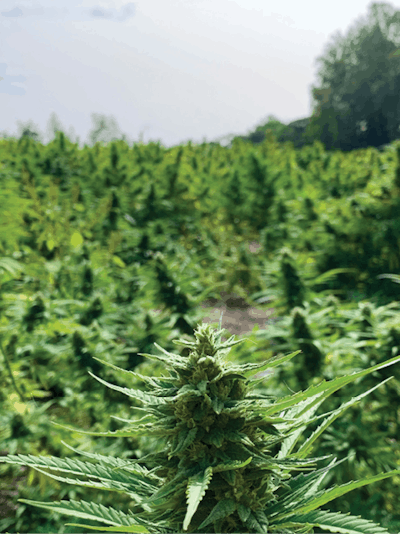
Courtesy of Luis Vega
White CBG variety
Despite Puerto Rico’s sometimes brutal weather—Vega’s family farm was hit by Hurricane Dorian in 2019, and Vega estimates it caused about $20,000 in damage to their crops—it’s easy to see the tantalizing potential of growing cannabis there. The legal framework for Puerto Rico’s medical cannabis program rolled out in 2017, yet it is already estimated to be a nine-figure business, according to NBC News. On the hemp side, government estimates indicate that a mature industry there could support 10,000 acres of hemp.
Back home in Shelton, Vega runs ¡WEPA! with an organic cultivation model that emphasizes protecting and preserving nature.
“We’re about 45% mineral, 5% other materials, 25% water,” Vega says of Connecticut’s soil. “We use organic methods—I’m not [USDA] certified organic, but we grow in an organic method as much as we can.”
As an example, he explains the company’s use of rye covers instead of plastic.
“We’re currently growing our rye, we’ll give it a chop, and then we will roll it to create a cover for the hemp so we don’t use plastic. ... It creates a weed barrier made of something already grown there. So through the season, as it continues to decompose, it will feed the soil itself and provide the weed barrier necessary for growing the hemp,” Vega says.
He starts his plants in a heated hoophouse adjacent to his fields. Then, he transplants them when they reach about 6 inches in height. Growing in a coastal state means Vega has the good fortune to have access to plenty of natural water sources, minimizing the need for irrigation.
“We use standard drip tape irrigation in the fields that need it. We are blessed with a water source on our property, which allows us not to have to water very often. ... We have a couple streams that run right through the fields, and we built a lot of the fields around them ...,” Vega says. “Water [sourcing] is a hard thing when it comes to growing hemp and cannabis, and most agriculture. If you have a dedicated water source right by your fields, that really goes a really long way.”
Harvest and Post Harvest
The farm grows three main varieties of hemp. For hemp flower and extracts, ¡WEPA! grows Hawaiian Haze and White CBG. Vega also grows another variety for its fiber. He compares that variety to bamboo—the plant grows tall with a narrow yet rigid center stalk, with fewer flowers at the top.
To maximize terpene preservation and create the best possible end product, Vega describes an extended harvesting and drying process for smokable hemp flower, carried out mostly by hand.
“We’ll harvest the top main colas first, and then we’ll put that into tobacco barns we converted for hemp drying. We’ll also use hemp dryers for the large biomass, ... so harvesting is done basically, by hand, over a month and a half,” he says, chuckling. “Tractors, haywagons, combines, ... it’s a long process, a beautiful dance of many people. … Scheduling and labor go a long way. ... We are blessed to receive help from local agricultural students during that time.”
Since ¡WEPA! does its own extraction and processing, the attention to detail doesn’t end after the plants are out of the ground.
“We are able to take biomass …, put it through our machinery and get a full-spectrum, high-CBD extract. With that, we also focus on some of the minor cannabinoids,” Vega says. “We currently extract CBG [cannabigerol] and CBN [cannabinol]. ... With processing, everything is time, temperature, vacuum. Everything separates out at a certain temperature for the amount of time it’s exposed to the heat and vacuum.”
When Vega talks about the extraction process, it’s easy to tell his experience with and passion for cannabis goes beyond just growing it.
“The process is subcritical ethanol extraction. ... We freeze the ethanol down to negative 78 degrees Fahrenheit, ... which strips the cannabinoids off the outside of the plant through our centrifuge,” Vega says. “From there we winterize it, and then we pass it through our rotary evaporator, which extracts all the ethanol solvent and leaves the crude CBD—or hemp oil, because it still has everything in it. That crude hemp oil is then filtered through short path distillation. From short path distillation it gets filtered again. Then, we put it through wiped film separation, and we are able to separate out terpenes and different cannabinoid profiles.”
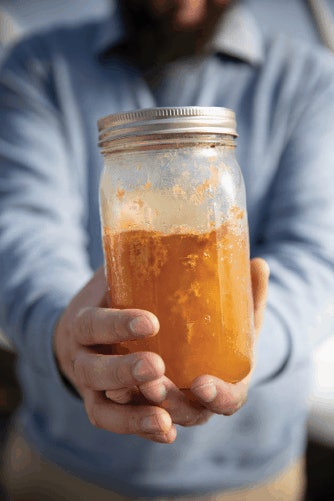
In fact, Vega advises all hemp farmers to process their own crops and sell finalized products directly to consumers as much as possible in order to broaden their business.
“For the grower, I believe that adding a production aspect to your scaled grows will help increase your profit margins. ... It’s the same principle if you were in dairy and started selling ice cream,” Vega says. “You can either sell the bulk [dairy] product, or be able to give out a finished product. Finished products are always more valuable across the board.”
A quick look at ¡WEPA!’s online store confirms that the business practices what Vega preaches. With CBD shatter, infused tea, hemp soap, hemp honey or hemp flower pre-rolls, there’s something for a wide range of hemp cannabinoid consumers. Vega’s shop even offers the chance to “adopt” a mature hemp plant, which comes with regular updates and photos of the plant and the option to assist with the harvesting process.
¡WEPA! is now offering products to help curb the ongoing COVID-19 pandemic, too. Vega is especially excited about the new hemp face masks the business has been able to create and what they mean for the potential of hemp beyond just its oil or flower.
“We subcontract to a local company that makes [reusable] hemp masks for us,” Vega says. “We also sell disposable hemp masks, which we purchase from a company we sell the hemp fiber to. It’s a thin fiber, ... it’s not an N95, but it’s more comparable to the blue [surgical] masks. ... They’re disposable and they’re cost-effective.”
The Spirit of ¡WEPA!
Vega is acutely aware that as a 35-year-old man of Puerto Rican descent from Brooklyn, he doesn’t exactly fit the description of a typical farmer. In fact, he intentionally infused some of his own cultural identity into his business through its name: ¡Wepa! is an expression of joy or accomplishment in Puerto Rico, similar to “good job!” or “awesome!” in English.
“It’s a term of jubilation,” Vega explains. “An American cowboy might say ‘Yee-haw!’ or something. ¡Wepa! is something that’s very synonymous with Puerto Rican culture. It’s like a ‘yes!’ ... that happy feeling that you should get when you’re enjoying one of our products. It’s the happy feeling of joy, it’s the happy feeling of success. ... That’s what I was hoping to convey as I named this.”
While the company’s name is a unique testament to his ethnic heritage, Vega says he doesn’t have many colleagues of color at his level. Aside from lingering stereotypes of Latino and Hispanic people in agriculture, he also points to the lack of historic land ownership by people of color as deterrents for minorities.
“Being a minority in this space ... we just don’t start with the same deck,” Vega says. “It’s like I’ve got five playing cards, you’ve got the entire deck.
“One of the biggest roadblocks to entry in any of these spaces is land ownership. Most of the time, a lot of the land that’s farmland is generationally passed down, ... so it makes it very difficult to get land to actually [grow on]. That’s part of the barrier to entry as minorities.
“But with that comes finding out how to overcome that. In agriculture, we have community land trusts that can specifically help minorities get onto land and farm them for lifelong leases.”
Being a young farmer of color also comes with certain stereotypes in agriculture.
“The engrained ancestral racism, ... it’s hard to talk about,” Vega says. “A lot of the people that still work on farms are migrant workers. I speak Spanish, I’m Latino. I’m relatively young. When I walk into a farm, most of the time, people think I’m there as an employee. ... They’re like, ‘Yo, when’s your boss getting here?’ I’m like, ‘I dunno, let’s wait for him!’”
Vega is fortunate to have had support from the state of Connecticut as well as the Minority Cannabis Business Association (MCBA). ¡WEPA! received an investment of $150,000 through the i2 Accelerator Program—a partnership between the MCBA and Merida Capital Partners, a private equity fund created to invest in the cannabis industry.
“I really appreciate the i2 Accelerator. ... That was a huge thing for us,” he says. “The Minority Cannabis Business Association allowed us some representation in a very large pond, one might say. ... It allowed us to be a little bit more visible, it allowed us to share our story. I tell everyone they should go out and join these association groups, these affinity groups that have the best interests in mind for their niche. ... The i2 Accelerator has provided us some capital, some mentorship, an avenue to work with the quote, unquote big dogs of the industry.”
In the Future
Despite some setbacks and an uncertain legislative future for the industry, Vega remains optimistic about the potential of both ¡WEPA! Farms as a business and future applications of the hemp plant. He sees hemp as a natural ally in the ongoing fight to expand clean energy and renewable resources.
“We’re super excited about the possibilities for sustainable resources in hemp,” says Vega.
“With ¡WEPA! we’re always looking to work with other farmers,” he continues. “We want to be able to consciously …source materials for other people that are doing white label, [and] we’d like to expand our white label and dropshipping abilities and possibilities.”
Perhaps above all else, as someone who became a cannabis consumer at a young age, Vega recognizes the power of cannabis, including hemp, to bring people together. He’s quick to credit the company’s success to his business operations team—West Coast partner and Chief Operations Officer Ashley Stallworth, Nursery Director Pat O’Hara, Brand Director Eve Santana—as well as the people who sit on ¡WEPA!’s board of directors, including Jason Ortiz, Dr. Juan Rios and Lead Pharmacist Adelso Fernandez.
“Our team is so important to the business. Hemp is a community thing,” Vega says. “... Nobody does anything by themselves. It’s the support of everyone around you that can push you forward.”
















